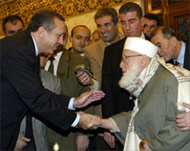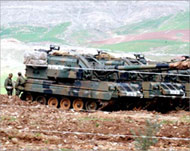Trials turn spotlight on Turkish military
The conduct of Turkey’s military has come under the spotlight as one senior figure goes on trial for corruption and another is allegedly implicated in a real estate scheme.

Consequently, the future of Nato’s second largest army – once Turkey’s most trusted and most powerful institution – is now being questioned.
The current trial is also being seen by many as the latest stage in a long process of change within the country. In this, the army has been increasingly stepping back from the controlling role it once played.
“The trial … is evidence that there is genuine change for transparency in the military,” commentator Burak Bekdil of the international Defence News says.
“Yet,” he warns, “there are no solid guarantees that this policy will be established.”
Out of reach
In one of Turkey’s most controversial court cases, retired Admiral Ilhami Erdil, who commanded the Turkish Navy from 1999 to 2002, faces charges of exerting pressure for military contracts to be allocated to a firm headed by his daughter and a close friend.
He also stands accused of irregularities over state compensation of his personal expenses.
 |
|
Turkey’s bid for EU membership |
Prosecutors alleged that the admiral illegally acquired two luxury apartments in Istanbul, worth a combined $1.25 million.
Accountants have testified that such real estate is well beyond the financial reach of such a state official.
In his defence, Erdil declared that the apartments were bought thanks to a loan from a wealthy friend, along with gold given to a daughter at her wedding, personal savings and other family funds.
Nevertheless, prosecutors say, the admiral still failed to declare the properties, despite being legally required to do so.
Pandora’s Box
In the meantime, prosecutors alleged that retired General Tuncer Kilinc, the former head of the National Security Council (NSC), has also been involved in dubious property dealings.
They claim links between the former general and a contractor, Osman Ozmen, whose attorney is retired Colonel Cavit Calis, a member of the tender commission for the military’s Special Forces.
While nothing has yet been proven, many are now talking about the trial opening what one expert on the Turkish military called “Pandora’s Box”.
Few in the past in Turkey have dared to talk openly about the Turkish military, which is protected from prosecution by a formidable barrier of laws and regulations.
 |
|
The army views with caution the |
Even now, it is an offence to say or do anything that might “undermine the morale” of the armed forces.
Thus few experts would allow Aljazeera.net to quote them directly.
The military has also launched three coup d’etats since 1960, and a “soft coup” as recently as 1997, which removed a pro-Islamist government from office, largely thanks to the threat alone of more tanks on the streets.
Since the 1980 “hard coup” – which saw most of Turkey’s current political party leaders arrested and jailed – the military has exercised strong influence over the country’s politics. Key in this was the NSC, a form of parallel government at which the generals relayed their commands to the country’s leaders – elected or not.
Turkey’s military has also exercised major economic influence. Through the Turkish Armed Forces Support Foundation, it has a significant share in most of Turkey’s big defence companies.
The military pension fund also owns one of the country’s biggest industrial conglomerates, Oyak Holding, which, among other things, manufactures Renault cars in Turkey.
Revolutionary change
“In August 2003, however, there was a quite revolutionary change,” said a Turkish military expert who did not want to be named.
“The government passed a package of reforms which established civilian control over the NSC, slashed its budget by 60% and severely curtailed its influence. This trial is part of that continuing wave of change.”
Yet others see the changes as having been initiated before 2003.
|
“[The army] knew of the Erdil case for a long time, but couldn’t decide whether to handle it publicly or privately” Gareth Jenkins, |
“The clean-up in the military began back in 2002,” Gareth Jenkins, a senior consultant fellow with the International Institute of Strategic Studies, said.
“Some officers were redeployed or investigated for corruption back then. They knew of the Erdil case for a long time, but couldn’t decide whether to handle it publicly or privately.
“Eventually, they decided they would have to go public because too much was leaking out.”
Hands-off approach
But under the current chief of the general staff, General Hilmi Ozkok, there has been a more hands-off approach to political issues.
 |
|
The Kurdish insurgency makes a |
“For a long time,” says Jenkins, “the military hasn’t wanted to exercise power directly. Instead, it wants a government that runs the country in a way that the military sees as acceptable.
Under Ozkok, it has also relaxed a little what it is prepared to do to keep the government within these parameters.”
The current government of Prime Minister Recip Tayyip Erdogan, although viewed with caution by the staunchly secular military for its pro-Islamist roots, has kept within those bounds.
It has, for example, backed off plans to end the prohibition on the wearing of headscarves in state institutions – with these coverings seen as a symbol of Islamist politics by the generals.
Opportunity
At the same time, Turkey’s bid for European Union membership has required the government to distance itself from both Islamist politics and repressive measures by the army.
|
“The trial … is evidence that there is genuine change for transparency in the military” |
“The last thing the military wants is to go down in history as jeopardising Turkey’s EU chances,” says Jenkins.
At the same time, many see the trial as a way for the military to re-polish its image and head off demand for more far reaching investigations of senior figures.
Some of this demand is widely rumoured to be coming from within the army itself, and in particular its junior officers.
Yet the armed forces also face a number of military challenges that some analysts feel are likely to keep the generals in the limelight in years to come and may prevent any thorough reform.
Turks fascinated
 |
|
Turkey’s generals are steering |
“There is the renewed fight with Kongra-Gel,” says Jenkins, referring to the guerrilla group formerly known as the PKK and based among some of Turkey’s ethnic Kurdish regions.
“This is a very soldier-intensive conflict, requiring a large army. Then there is the situation in northern Iraq, which is highly uncertain. Changing the army with these going on is going to be very difficult.”
Nonetheless, many ordinary Turks are fascinated by the revelations that are now surfacing in the Erdil trial. Whether found guilty or not, they may never look on the military in quite the same way again.
“All Turks are very proud of their army,” says former soldier Baris Koktan. “Corruption wounds us all.”